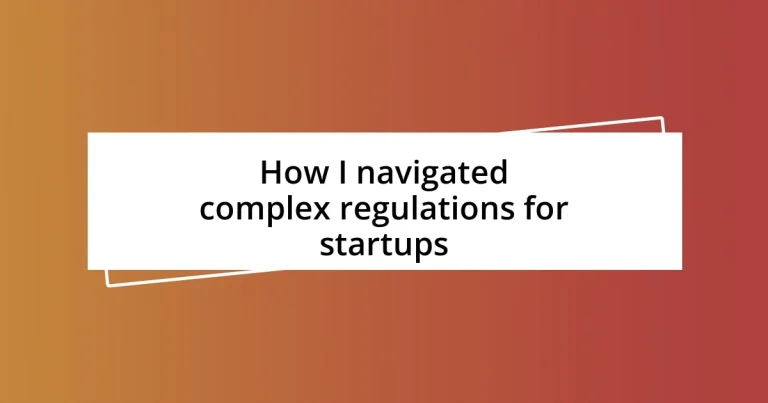Key takeaways:
- Understanding and embracing regulations can transform perceived roadblocks into opportunities for innovation and growth.
- Creating a proactive compliance strategy, including a regulatory checklist and engaging your team, fosters a culture of accountability and resilience.
- Regularly monitoring regulatory changes, supported by technology and industry connections, empowers startups to adapt swiftly and avoid potential crises.
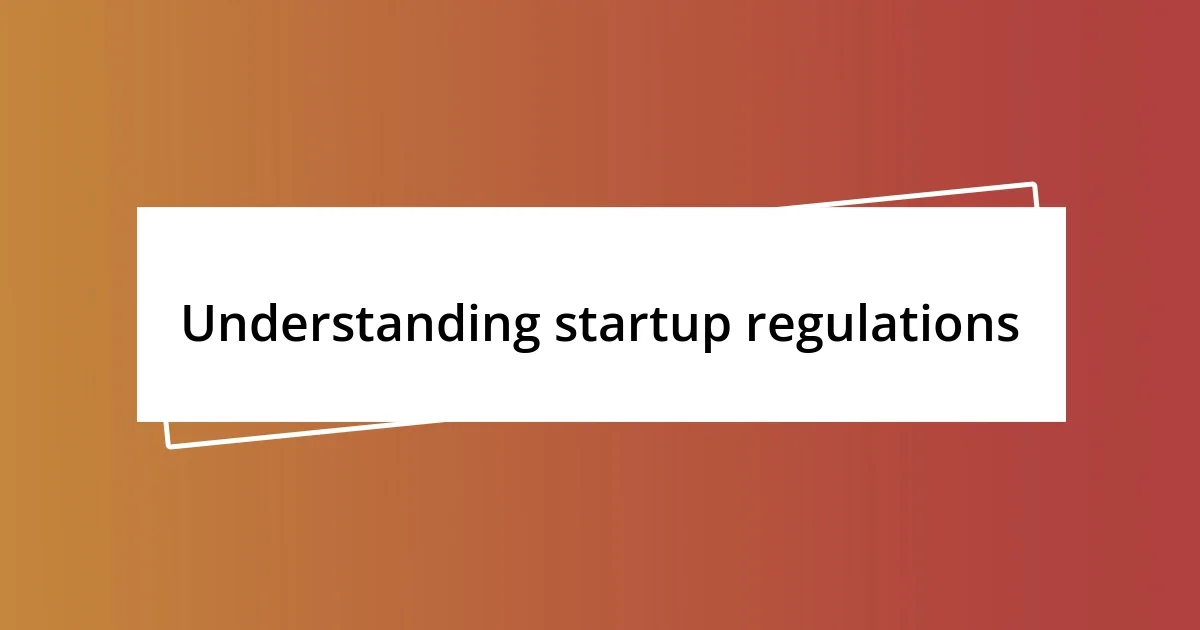
Understanding startup regulations
Navigating startup regulations can feel like traversing a maze. I vividly remember my own early days; the sheer volume of guidelines and rules had me second-guessing every decision. It often made me wonder: Why isn’t there a straightforward map for entrepreneurs to follow?
As I dug deeper into the regulatory landscape, I realized that each jurisdiction has its own set of rules that can significantly impact a startup’s operations. I once encountered a local zoning law that almost derailed my plans for a new office space. How rewarding it was to finally understand these complexities, turning potential pitfalls into stepping stones for growth!
It’s essential to remember that regulations aren’t just hurdles; they often serve to protect consumers, foster fair competition, and maintain safety standards. Reflecting on my journey, I found that embracing this perspective helped me turn what seemed like roadblocks into opportunities for better business practices. Isn’t it fascinating how understanding the rules can actually empower us to innovate within them?
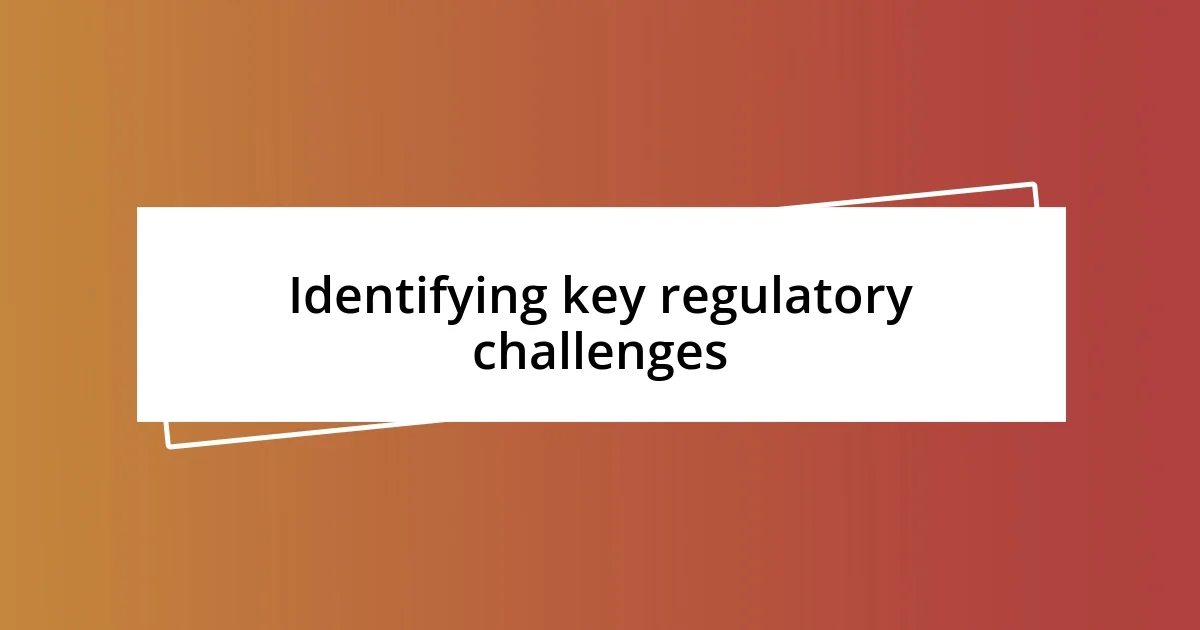
Identifying key regulatory challenges
Identifying key regulatory challenges requires a keen eye and a proactive approach. I remember sitting in my office, poring over a bewildering stack of legal documents. It felt overwhelming, but I knew that pinpointing the most pressing regulatory challenges was critical. Through this process, I learned that challenges often stem from licensing requirements, tax obligations, and compliance with local laws.
To navigate these complexities, I found it helpful to focus on the following:
- Licensing Issues: Understanding what licenses my startup needed to operate legally in our specific industry.
- Tax Regulations: Staying up to date with local, state, and federal tax obligations that could impact cash flow.
- Employment Laws: Navigating the maze of hiring regulations to ensure a compliant and fair work environment.
- Consumer Protection Rules: Recognizing essential guidelines to safeguard customer rights and build trust.
- Local Zoning Laws: Assessing geographical regulations that could affect where I could operate my business.
By breaking down these challenges into manageable segments, I embraced the learning journey rather than fearing it, allowing me to foster a resilient mindset that ultimately drove my startup’s success.

Utilizing legal resources effectively
Utilizing legal resources effectively goes beyond mere compliance; it requires strategic thinking. In my experience, the first step was discovering local legal aid organizations. I remember attending a local workshop where I connected with an attorney specializing in startups. Their guidance not only clarified intricate legal jargon but helped me see my business through a legal lens, which turned out to be valuable for making informed decisions.
I found that many legal resources offer services on a sliding fee scale, making them accessible for startups. Engaging in initial consultations can lead to crucial insights without straining finances. I did this when drafting my first contracts, and the attorney’s insights transformed what felt like daunting paperwork into manageable tasks, allowing me to focus on scaling my business instead of getting lost in legal jargon.
| Type of Resource | Effectiveness |
|---|---|
| Legal Workshops | Networking and knowledge gained from real-life examples. |
| Online Legal Platforms | Affordable advice and templates made my drafting process much easier. |
| Local Bar Association Clinics | Direct access to legal professionals for personalized guidance. |
| Business Incubators | Supportive community that provides both legal and strategic resources. |
Leveraging technology has also been a game-changer. When I discovered online legal resources, it was like finding a treasure trove of templates and guidelines tailored for startups. I remember utilizing an online platform for LLC formation, and the straightforward interface made filing feel like a breeze. The convenience of having resources at my fingertips meant I could focus on my business model rather than getting sidetracked by legalities, which was incredibly freeing.
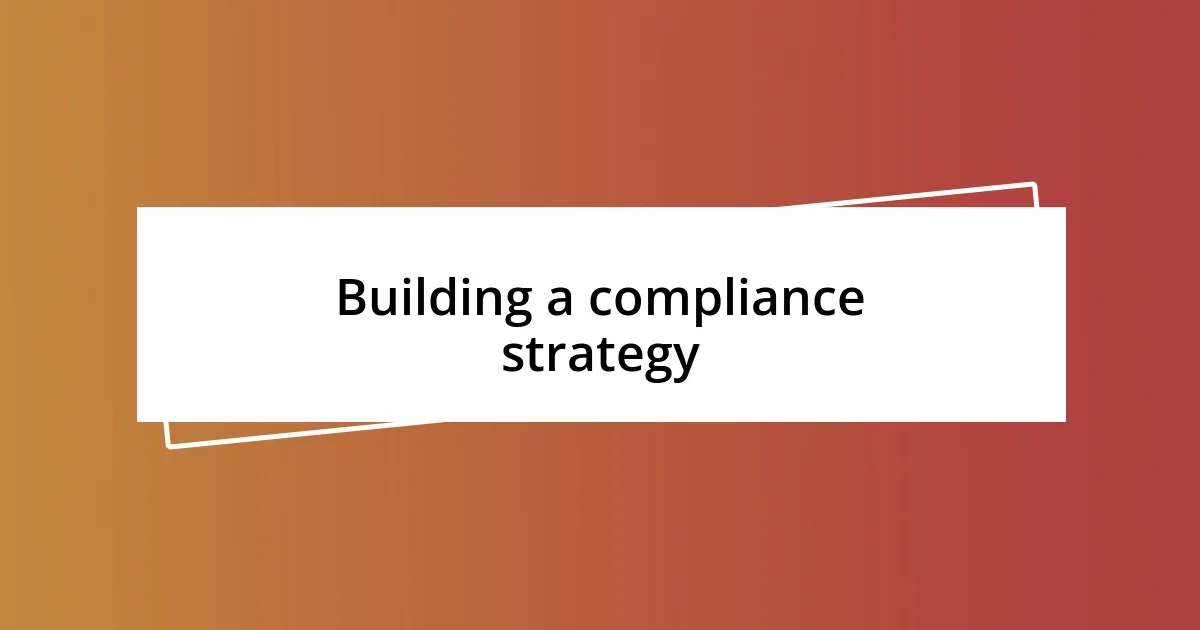
Building a compliance strategy
Building a compliance strategy seems daunting, but I believe it can become a manageable part of your startup’s growth if approached methodically. From my experience, I started by charting out all necessary regulations and requirements specific to my industry. It felt like piecing together a jigsaw puzzle, but each piece—whether it was about data protection laws or health regulations—started to reveal the bigger picture of compliance.
To ensure I covered all bases, I created a compliance calendar. This simple tool became my best friend, reminding me of key deadlines and obligations. I vividly remember the relief it brought when I avoided a potential penalty simply because I didn’t miss an important filing date. Have you ever felt rush or anxiety closing in on a deadline? That sense of pressure can be overwhelming, but planning ahead really helped keep my mind clear and focus on building my dream.
Engaging my team was another crucial step. Early on, I promoted a culture of compliance, where everyone felt responsible for maintaining our ethical standards. It wasn’t just a top-down approach; I encouraged my team to voice their concerns and share ideas. The conversations we had transformed compliance from a chore into a collective mission, which ultimately enriched our startup’s values. How might your own team benefit from a shared commitment to compliance? I found that fostering this culture made it easier to maintain focus, ensuring we were all aligned toward the same goals.

Engaging with industry experts
Engaging with industry experts can be the key to unlocking valuable insights that might otherwise slip under the radar. To illustrate, I recall reaching out to a mentor who had extensive experience in my field. Their openness and willingness to share not only provided clarity on the regulations I faced but also opened doors to networks I hadn’t considered. The feeling of having someone in my corner, guiding me through the maze, was incredibly reassuring.
Moreover, attending industry events became a cornerstone of my strategy. I still remember one particular conference where I struck up a conversation with a seasoned entrepreneur over coffee. Their candid advice about navigating regulatory challenges helped me rethink my strategy, transforming uncertainty into actionable steps. Have you ever found that a simple chat can illuminate the path forward? It’s moments like these that cement the importance of connecting with those who have walked the same road before you.
I also made it a point to follow up and maintain those relationships. Sending a quick thank-you email after our conversation turned into an ongoing dialogue where I could seek advice as challenges arose. The emotional connection built through these interactions added an extra layer of support during stressful times. How might your own network evolve if you invest time in nurturing these connections? I believe that fostering these relationships with industry experts not only enriches your knowledge but also helps craft a robust support system as you navigate your startup journey.
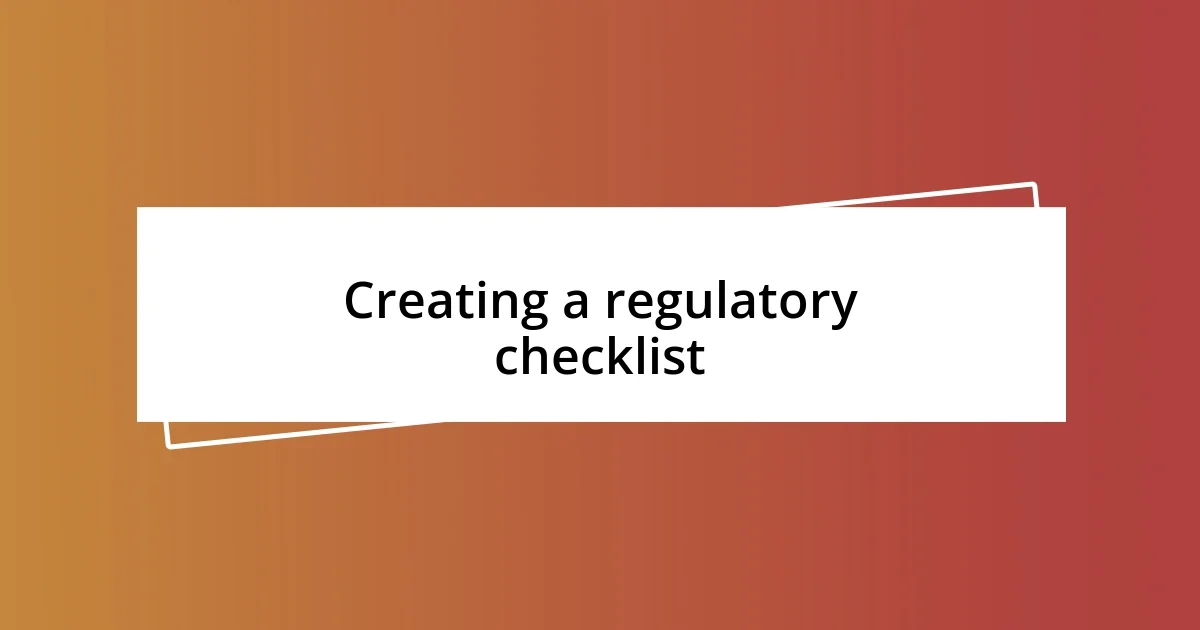
Creating a regulatory checklist
Creating a regulatory checklist is an empowering step that I found incredibly helpful during the hectic early days of my startup. I began by breaking down all the regulations into categories, such as labor laws, tax obligations, and industry-specific requirements. This approach transformed what initially seemed like an insurmountable task into a manageable action plan—almost like checking items off a grocery list.
One memorable moment was when I discovered a new compliance requirement that could have caught me off guard. By including a section on emerging regulations in my checklist, I made a habit of regularly reviewing updates in our industry. This proactive mindset not only kept me ahead of the curve but also provided an invaluable sense of security. Have you ever faced a surprise regulatory change that put you in a scramble? Trust me, staying informed was a game-changer.
During this process, I also incorporated feedback from my team into the checklist. Their diverse perspectives helped identify potential regulatory gaps that I may have overlooked. I vividly recall a brainstorming session where someone pointed out a detail about environmental regulations—something I hadn’t considered before. This collaborative effort not only strengthened our compliance stance but also created a sense of camaraderie among us. How could your team contribute to an evolving regulatory checklist? I truly believe that collaboration leads to a more resilient approach to navigating complex regulations.
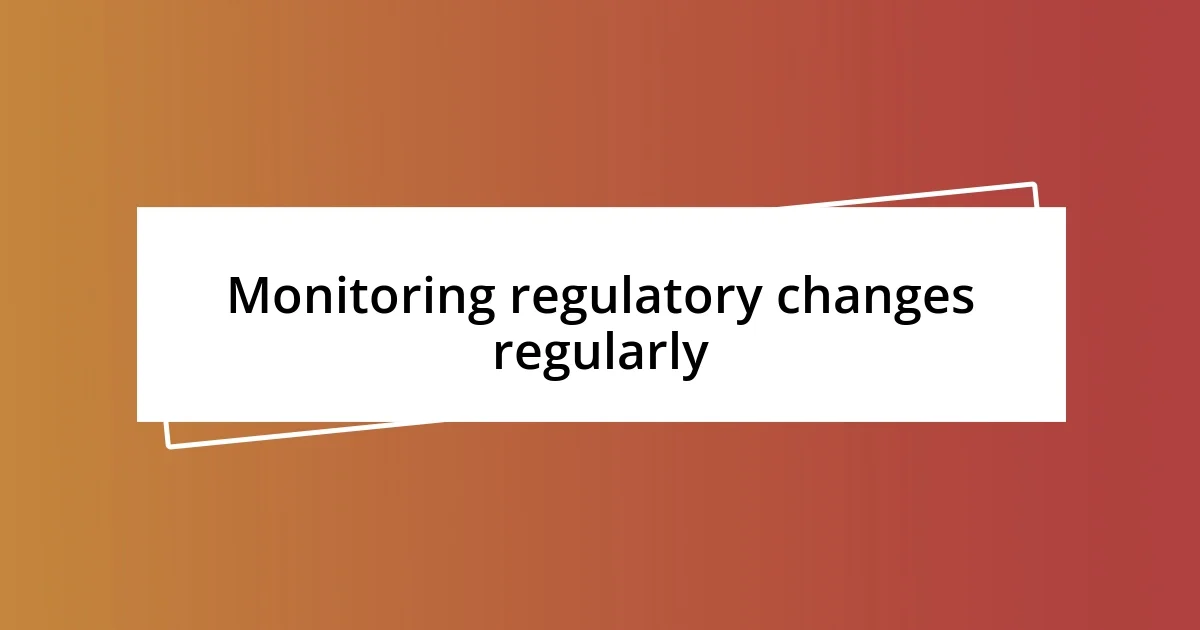
Monitoring regulatory changes regularly
Monitoring regulatory changes regularly became a crucial part of my startup journey. I remember the days when I felt overwhelmed by the sheer volume of rules and updates. It was like trying to keep up with a fast-moving train; it often felt impossible. By setting aside specific times each week to sift through relevant news sources and industry publications, I created a routine that kept me informed, and I couldn’t overstate how manageable this made the process.
There was one instance where I stumbled upon a regulatory shift that could have had an impact on my business model. I can still recall the mix of relief and excitement when I discovered it in time to pivot my approach. This hands-on vigilance not only prevented a potential crisis but also nurtured a confidence that I could adapt swiftly. Have you ever had that exhilarating moment when you dodge a bullet simply because you were paying attention? That kind of awareness empowers you, allowing you to thrive instead of just survive in a complex landscape.
In my experience, leveraging technology also played a significant role in my regulatory monitoring efforts. I started using alert systems that would notify me about changes in laws applicable to my industry. At first, I wasn’t sure if I could trust these tools, but they soon proved invaluable. The sense of peace I felt knowing that I wouldn’t miss an important update was liberating. What tools are you using to stay informed? I believe that combining diligence with technological resources can revolutionize how we navigate regulations, ensuring that we not only keep pace but lead the way.












